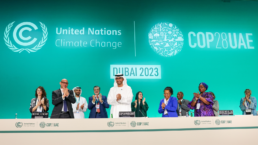Rich countries are dodging responsibility for adaptation aid, infuriating leaders from vulnerable nations.
by Naveena Sadasivam & Jake Bittle, Grist
The United Nations climate summit in Dubai promises no shortage of drama in its final days — in part because negotiations over whether or not to phase out global fossil fuel use appear to have collapsed. One major goal of this year’s conference, known as COP28, is a “global stocktake” documenting the world’s climate progress and next steps on climate action. But as of Monday, any reference to ending oil and gas use had disappeared from the draft text, leading to widespread anger among climate advocates. Former U.S. Vice President Al Gore declared that the conference was “on the verge of complete failure.”
But the well-publicized debate over fossil fuels threatens to overshadow another major question dogging negotiations as the clock runs out: whether or not world leaders can agree on how to adapt their countries’ infrastructure to withstand global warming. As climate-driven disasters continue to make headlines around the world, the fate of millions in especially vulnerable regions such as Africa and Southeast Asia hinges on this question.

Though hundreds of international negotiators have spent the past fortnight tangling over a convoluted document that outlines how countries will adapt to climate change, they haven’t yet reached consensus on who exactly will pay for the phenomenally expensive undertaking — or even how to define successful climate adaptation in the first place. As the end of the conference approaches, stakeholders who spoke to Grist described the most recent draft text of the so-called global goal on adaptation as “watered-down,” “vague,” and “confusing.”
Recent Posts
‘Unconstitutional. Unethical. Authoritarian.’ ICE Bars Millions Of Immigrants From Bond Hearings
July 18, 2025
Take Action Now One watchdog said the new policy “seems like a blatant attempt to stop them from exercising their right to due process.”……
Americans Are Not Nearly Alarmed Enough About Climate Change
July 18, 2025
Take Action Now Americans still don’t comprehend how imminent, dangerous, and far-reaching the threat is—and journalists are partly to blame.By…
The IRS Is Building A Vast System To Share Millions Of Taxpayers’ Data With ICE
July 17, 2025
Take Action Now ProPublica has obtained the blueprint for the Trump administration’s unprecedented plan to turn over IRS records to Homeland Security…
Israel’s Sudden Assault On Syria Is Unchecked Aggression
July 17, 2025
Take Action Now Jerusalem is bombing Damascus and threatening al-Sharaa’s rule, while Washington was hoping to help the nascent government on…




